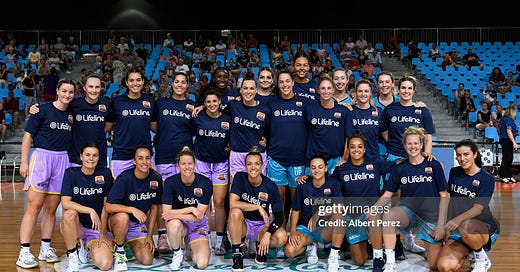My final year in the WNBL was the lowest, psychologically, I have felt in my life.
There is no other way to describe it except for a depression: it was constant, undefined weight pressing across my chest. My mind felt slow and darkened. I lost my appetite, I did not want to see friends. It felt like I could not move. It felt, more worryingly, like I did not want to move.
My mental health has always been classified as high functioning, despite any depression or anxiety — meaning I get all my required tasks done, even if I find myself unable to experience happiness. This was worse, depleted: I could barely drag myself through the motions of the basketball season.
I stopped arriving at the stadium three hours before a training session, or a game, to do my own training before the team arrived. I stopped staying two hours after the main practice to do more agility and conditioning and shooting out on the back courts. I scraped through the gym program and I left as soon as I could. I no longer brought a protein shake, mixed carefully with measured amounts of creatine and glutamine and greens power, to have immediately after exercising. I no longer bothered to consume the five meals of at least thirty grams of protein I had planned out with a dietician, and timed with alarms. I no longer asked for extra conditioning, or to be involved with appearances or children’s coaching clinics. I no longer prepared or recovered with twice daily sessions of stretching and rolling. I attended exactly what I needed to attend. I performed the precise role I needed to perform. I struggled to sleep. I spent a lot of energy trying not to cry.
Are you new here? Take the new reader survey.
I knew what was making me sick.
The hope in me was dying. It had been dying for a while — a slow, protracted expiration — because my career has been one demarcated by failure and the cost of resilience is sometimes your own sense of worth, but recently its decay had accelerated. Receiving my sixth voluntary services agreement from the Jayco franchise had been mortifying, and only further solidified my sense of fraud as an athlete, but I had signed it because it was my sole option into the WNBL. There was still, deep inside me, a fragile sense of purpose.
Then abruptly, months after the national league season ended, post a random state league game where I was supposed to be the captain, the hope was dead: I realised the metaphorical road, that winding national league development pathway I had so trustingly hobbled along, was less of a road and more a secret dead end.
The realisation felt like it took hunks of meaning in my life with it and I spiralled, so far down I barely recognised myself. I could not pull myself out of it: the grief was thick and complicated. It blackened everything.
A Mental Health Essay is a memoir about old dreams, new hopes & the grief of memory.
Wondering why you have to pay? Refer three friends and read for free.
Keep reading with a 7-day free trial
Subscribe to [all the] bst to keep reading this post and get 7 days of free access to the full post archives.
![[all the] bst](https://substackcdn.com/image/fetch/$s_!fP5o!,w_80,h_80,c_fill,f_auto,q_auto:good,fl_progressive:steep,g_auto/https%3A%2F%2Fsubstack-post-media.s3.amazonaws.com%2Fpublic%2Fimages%2F6e00de64-d4b0-44c5-9878-6f93beb98034_600x600.png)
![[all the] bst](https://substackcdn.com/image/fetch/$s_!gMgQ!,e_trim:10:white/e_trim:10:transparent/h_72,c_limit,f_auto,q_auto:good,fl_progressive:steep/https%3A%2F%2Fsubstack-post-media.s3.amazonaws.com%2Fpublic%2Fimages%2F2d395873-88a7-4499-a321-96c4f5e6ad0d_1344x256.png)

![[all the] bst](https://substackcdn.com/image/fetch/$s_!fP5o!,w_36,h_36,c_fill,f_auto,q_auto:good,fl_progressive:steep,g_auto/https%3A%2F%2Fsubstack-post-media.s3.amazonaws.com%2Fpublic%2Fimages%2F6e00de64-d4b0-44c5-9878-6f93beb98034_600x600.png)
